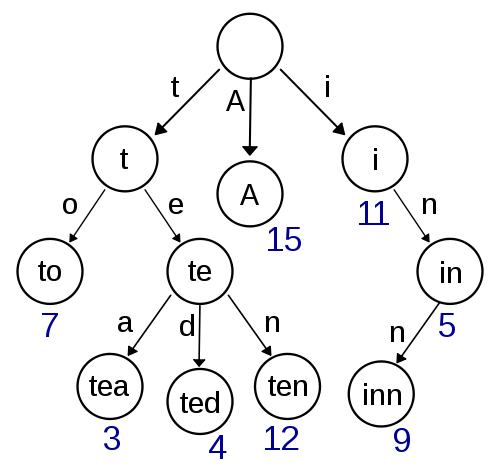Trie Time¶
Python's defaultdict, Efficient Membership Tests, and Grouping Words By Prefix
Dictionaries All the Way Down¶

KeyErrors are Annoying¶
In [3]:
d = {}
d['flan'] = {}
try:
d['bender']
except KeyError:
print ":sadpanda:", d
:sadpanda: {'flan': {}}
setdefault and defaultdict¶
In [4]:
sd = {}
a = sd.setdefault('bender', [])
sd.setdefault('nibbler', {})['leela'] = 'why not zoidberg'
print a, sd
[] {'nibbler': {'leela': 'why not zoidberg'}, 'bender': []}
In [5]:
from collections import defaultdict
dd = defaultdict(dict)
dd[1][2] = 3
try:
dd[4][5]
except KeyError:
print ":sadpanda:", dd
:sadpanda: defaultdict(<type 'dict'>, {1: {2: 3}, 4: {}})
In [6]:
dd_callable = defaultdict(lambda: defaultdict(dict))
try:
dd_callable[3][4][5]
except KeyError:
print ":sadpanda:", dd_callable
:sadpanda: defaultdict(<function <lambda> at 0x10ab87410>, {3: defaultdict(<type 'dict'>, {4: {}})})
Yo Dawg¶

In [7]:
def infinite_defaultdict():
return defaultdict(infinite_defaultdict)
idd = infinite_defaultdict()
idd['x']['y']['z']['a']['b']['c']
print dict(idd)
{'x': defaultdict(<function infinite_defaultdict at 0x10ab87320>, {'y': defaultdict(<function infinite_defaultdict at 0x10ab87320>, {'z': defaultdict(<function infinite_defaultdict at 0x10ab87320>, {'a': defaultdict(<function infinite_defaultdict at 0x10ab87320>, {'b': defaultdict(<function infinite_defaultdict at 0x10ab87320>, {'c': defaultdict(<function infinite_defaultdict at 0x10ab87320>, {})})})})})})}
Re'trie'val¶
- a trie is a tree that stores items with a common prefix on the same branch
- Fast lookups with recursion
- Max width (number of possible letters + 1)
- Max height (longest word + 1)
- Answers some 'hard' questions really easily (autocomplete)

Portmanteaus are cool¶
defaultdictrie
In [8]:
import io
import sys
def TrieNode():
return defaultdict(TrieNode)
def add_word(word, node):
if not word:
node[None] = None
return
add_word(word[1:], node[word[0]])
def exists(word, node):
if not word:
return None in node
return exists(word[1:], node[word[0]])
In [9]:
root = TrieNode()
wordfile = 'wordlist.txt' # http://codekata.com/kata/kata06-anagrams/
word_list = []
with io.open(wordfile, encoding='latin-1') as wf:
for line in wf:
word = line.strip()
word_list.append(word)
add_word(word, root)
word_set = set(word_list)
In [10]:
def _path(node, path=''):
# DFS, basically
for k, v in node.iteritems():
if k is None:
yield path
continue
new_path = ''.join((path, k))
for p in _path(v, new_path):
yield p
def find_words_with_prefix(prefix, node):
original = prefix
# find the start node
while prefix:
node = node[prefix[0]]
prefix = prefix[1:]
for path in _path(node, original):
yield path
PREFIX_TO_FIND = 'casti'
sorted(find_words_with_prefix(PREFIX_TO_FIND, root), key=len)
Out[10]:
[u'casting', u'castings', u'castigate', u"casting's", u'castigates', u'castigated', u'castigator', u'castigation', u'castigating', u'castigatory', u'castigators', u'castigations', u"castigator's", u"castigation's"]
Are we sure it's correct?¶
In [11]:
def find_words_in_container_with_prefix(prefix, container):
for word in container:
if word.startswith(prefix):
yield word
In [12]:
list_from_a = sorted(find_words_in_container_with_prefix(PREFIX_TO_FIND, word_list))
list_from_b = sorted(find_words_with_prefix(PREFIX_TO_FIND, root))
assert list_from_a == list_from_b
Why use this?¶

- membership tests are much faster than list, slightly slower than set
- lookups are
O(m), wheremis the number of letters in the word
- lookups are
- find all words that start with 'cat'
- much faster than naive solutions, though there is a memory cost
Membership Test Performance¶
In [13]:
s = 'castigate'
assert exists(s, root) and s in word_list and s in word_set
In [14]:
%timeit s in word_list
100 loops, best of 3: 7.43 ms per loop
In [15]:
%timeit s in word_set
The slowest run took 25.34 times longer than the fastest. This could mean that an intermediate result is being cached. 10000000 loops, best of 3: 160 ns per loop
In [16]:
%timeit exists(s, root)
100000 loops, best of 3: 2.66 µs per loop
In [17]:
%timeit exists('cat', root)
The slowest run took 4.31 times longer than the fastest. This could mean that an intermediate result is being cached. 1000000 loops, best of 3: 941 ns per loop
In [18]:
%timeit exists('flargle', root)
The slowest run took 5.82 times longer than the fastest. This could mean that an intermediate result is being cached. 1000000 loops, best of 3: 1.89 µs per loop
In [19]:
%timeit 'flargle' in word_set
The slowest run took 42.89 times longer than the fastest. This could mean that an intermediate result is being cached. 10000000 loops, best of 3: 44.5 ns per loop
In [20]:
%pylab inline
import bisect
funcs = dict(List=lambda x: x in word_list,
Set=lambda x: x in word_set,
Trie=lambda x: exists(x, root), ListBinSearch=lambda x: bisect.bisect(word_list, x))
values = sorted([w for w in find_words_with_prefix('cast', root) if "'" not in w], key=len)
data = defaultdict(lambda : defaultdict(list))
for name, func in funcs.iteritems():
seen = set()
for v in values:
x = len(v)
if x in seen:
continue
seen.add(x)
y = %timeit -n1000 -q -o func(v)
data[name]['x'].append(x)
data[name]['y'].append(y.best)
Populating the interactive namespace from numpy and matplotlib
In [21]:
fig, ax = subplots()
for i, (k, v) in enumerate(data.iteritems()):
plot(v['x'], v['y'], label=k)
ax.legend()
ax.set_xlabel("word length")
ax.set_ylabel("time")
ax.set_title("Membership Test Performance vs Word Length")
ax.grid(True)
In [22]:
fig, ax = subplots()
for i, (k, v) in enumerate(data.iteritems()):
if k == 'List':
continue
plot(v['x'], v['y'], label=k)
ax.legend()
ax.set_xlabel("word length")
ax.set_ylabel("time")
ax.set_title("Membership Test Performance vs Word Length")
ax.grid(True)
Find Word with Prefix Performance¶
In [23]:
%timeit list(find_words_in_container_with_prefix(PREFIX_TO_FIND, word_list))
10 loops, best of 3: 81.7 ms per loop
In [24]:
%timeit list(find_words_in_container_with_prefix(PREFIX_TO_FIND, word_set))
10 loops, best of 3: 152 ms per loop
In [25]:
%timeit list(find_words_with_prefix(PREFIX_TO_FIND, root))
10000 loops, best of 3: 23.4 µs per loop
In [26]:
funcs = dict(List=lambda x:list(find_words_in_container_with_prefix(x, word_list)),
Set=lambda x: list(find_words_in_container_with_prefix(x, word_set)),
Trie=lambda x: list(find_words_with_prefix(x, root)))
values = ['c', 'ca', 'cat', 'cast', 'csfkjf']
ind = np.arange(len(values))
width = 0.30
fig, ax = subplots()
for i, name in enumerate(['Trie', 'List', 'Set']):
y = []
for v in values:
t = %timeit -n10 -q -o funcs[name](v)
y.append(t.best)
bar(ind + (i*width), y, width, color='rgb'[i], label=name)
ax.legend()
ax.set_ylabel('Time')
ax.set_title('Time to Find Words Containing Prefix')
ticks = ax.set_xticks(ind + (width * len(funcs) / 2.0))
labels = ax.set_xticklabels(values)
Measuring Memory¶
- NOT space efficient
- somewhat misleading
- harder to measure
In [27]:
len(root), len(word_list), len(word_set)
Out[27]:
(57, 338882, 338882)
In [28]:
sys.getsizeof(root), sys.getsizeof(word_list), sys.getsizeof(word_set)
Out[28]:
(3352, 3012912, 8388840)
In [29]:
AVERAGE_WORD_LENGTH = sum(len(w) for w in word_list) * 1.0 / len(word_list)
LONGEST_WORD = max(len(w) for w in word_list)
print AVERAGE_WORD_LENGTH, LONGEST_WORD
sys.getsizeof(root) * len(root) * LONGEST_WORD
9.20367266482 60
Out[29]:
11463840
In [31]:
max_depth = 0
max_width = 0
def rec_size_of(d, depth=0, width=0):
global max_depth, max_width
max_depth = max(depth, max_depth)
max_width = max(width, max_width)
if d is None:
return sys.getsizeof(d)
return sys.getsizeof(d) + sum(rec_size_of(v, depth + 1, width+1)
for v in d.itervalues())
print rec_size_of(root), max_depth, max_width
233391968 61 61
In [32]:
import cPickle as pickle
set_string = pickle.dumps(word_set)
trie_string = pickle.dumps(root)
a, b = sys.getsizeof(set_string), sys.getsizeof(trie_string)
print a, b, a - b
6735224 17431299 -10696075
In [ ]: